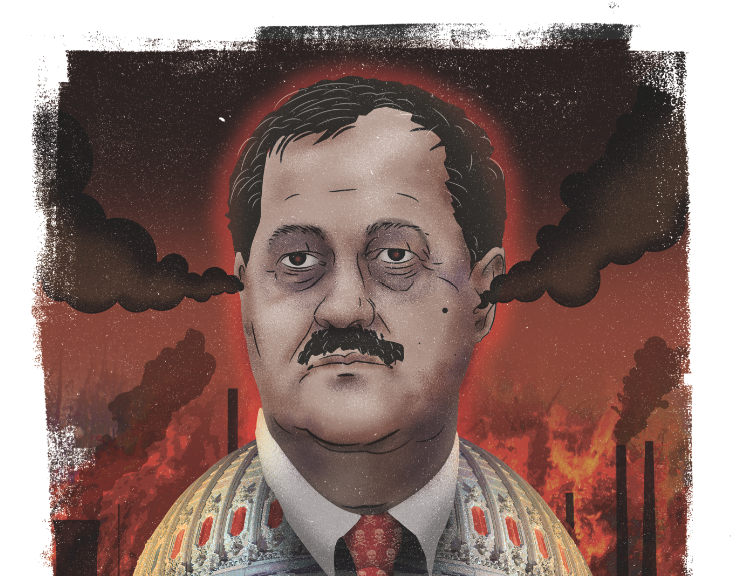Two years ago, Don Blankenship’s lawyers argued that the longtime coal baron was so despised in West Virginia that he could not receive a fair trial from a state jury. Now, the former Massey Energy CEO is setting out to prove his counsel wrong by joining the 2018 West Virginia Republican primary for U.S. Senate.
“I’m Don Blankenship, candidate for U.S. Senate, and I approved this message,” he announced at the beginning of a 30-second ad posted to his Vimeo page.
Blankenship’s entry into the race for the seat currently held by former Gov. Joe Manchin, a Democrat, was reported on Wednesday by Mountain State-based media outlets and confirmed by the chairman of the West Virginia Republican Party.
Blankenship will join an already heated battle between U.S. Rep. Evan Jenkins and Attorney General Patrick Morrisey, essentially breaking down along the national battle lines that are emerging between GOP factions: Jenkins represents the establishment Republican selected by Senate Majority Leader Mitch McConnell, while Morrisey is the insurgent backed by former White House aide Steve Bannon of Breitbart.
Blankenship’s candidacy blows up that dynamic. His persona and name recognition dwarfs that of either of the others, as he has been a presence in West Virginia coal culture since the early ’80s. His career has been a long series of labor, miner safety, and environmental horrors, making him the subject of countless books and news stories, including a Rolling Stone profile that memorably labeled him as the “Dark Lord of Coal Country.”
In “Mine War on Blackberry Creek,” a documentary film produced about a labor fight in the early ’80s, a still-new-to-Massey Blankenship laid out his vision of raw capitalism as “a jungle.” “Unions, communities, people —everybody’s gonna have to learn to accept that in the United States you have a capitalist society, and that capitalism, from a business standpoint, is survival of the most productive,” Blankenship said.
Blankenship and Massey won that fight, breaking the United Mine Workers of America in what now looks like a turning point in labor history. Blankenship’s subsequent rise through the company saw a dramatic expansion in brutal mountaintop removal strip mining techniques, as well as a relentless approach to maximize profit by cutting costs that endangered not only miners but those who lived in the communities around Massey mines.
In one case, people living near a Massey mine found that their groundwater had been poisoned because the company disposed injected toxic waste into abandoned coal shafts. Blankenship’s own neighborhood was affected; he had a private water line run to his house from nearby Matewan, but didn’t offer the service to others.
Simultaneously, Blankenship invested millions of dollars into building the West Virginia Republican Party. At one point in the 2000s, he gave $3 million toward the election of a state supreme court candidate, who then helped overturn a $50 million jury decision against Blankenship in a civil suit.
The biggest outrage in a career full of them came in April 2010, when 29 men died at Massey’s Upper Big Branch mine after sparks from a longwall cutter ignited a massive explosion. Four separate investigations found that poor ventilation, poor rock dusting, and a company culture that encouraged poor safety practices created conditions for the explosion. Blankenship, however, has peddled a different theory, blaming the federal Mine Safety and Health Administration (MSHA) for creating the conditions that caused the explosion. He commissioned a 2014 documentary to tell his side of the story, prompting several individuals featured in the film to disclaim it—including Manchin, who was governor at the time of the disaster.
Federal prosecutors eventually brought criminal charges against Blankenship, not for the disaster itself but for conspiring to skirt safety regulations at the mine. Blankenship faced three felony counts worth a potential 30 years, but was convicted only of a misdemeanor that put him in prison for one year.
Since emerging from confinement earlier this year, Blankenship has used Twitter and his website to push his Upper Big Branch theory blaming the government, as well as to attack Manchin and former President Barack Obama.
Blankenship clearly intends to use his Senate campaign—and the media attention that will come with it—as a megaphone for the message he’s been hammering the last few years. Greg Thomas, a representative for Blankenship, told West Virginia Public Radio that his run for office is “about getting the truth out about [the Upper Big Branch disaster] and exposing a government cover-up.”
“It’s going to be interesting whether or not this political campaign is just an extension of this campaign to clear his name, or whether he’s really going to weigh in on the issues facing West Virginia in the future,” said Bill Price, a Charleston, West Virginia-based Sierra Club organizer.
For conservationists and environmentalists, there’s not much to like about any of the three GOP candidates. “All three of them are fairly conservative and pushed back significantly on any environmental regulations,” Price said. “As far as their votes on anything related to the Clean Power Plan, the Stream Protection Rule, there’s not any significant difference between any of them.”
Scott Crichlow, an associate professor of political science at West Virginia University, said that Blankenship exemplifies a recent trend in politics where personal brands largely outweigh policy stances. In a low-turnout, three-way Republican primary—in the last GOP U.S. Senate primary in 2014, only 85,322 people cast ballots—there’s a real chance that Blankenship could capture a plurality of voters. Says Crichlow, “If he actually puts resources into this and it’s a three person, well-resourced race, it doesn’t take that many voters to win.”








